"What we are seeing now is a crop of cinema releases that are all
about the fluctuation between what's staged and what's real." |
Stella Bruzzi, in New Documentary: A Criticial Introduction (2000) |
"I don't mind what people call it, it's meant to provoke.
Part of the rationale was to show how truth is unstable." |
Clio Barnard, in The Guardian, 2011 |
"Nowadays people want to face up with what's actually happening,
because it's actually what's said and you write what's said, you don't lie.
If you're writing about something that's actually happened, you're not gonna lie." |
Andrea Dunbar, Arena, 1980 |
In the most simplistic of terms, Clio Barnard's multi award-wining feature-length debut The Arbor is a portrait of the celebrated Bradford-born playwright, Andrea Dunbar. In the most realistic of terms, The Arbor, like Dunbar herself is a rare thing. Quiet and unassuming, the reaction to the film has been anything but, and saw it snowball from a project originally intended for transmission on television, to a film that gained a film theatrical release and saw director Barnard take home the award for Best New Documentary Filmmaker at the Tribeca Film Festival in 2010, despite the fact some members of the jury debated whether it was a documentary at all. Of course, the primary function of any art work is to provoke debate, and The Arbor certainly does that. Given Barnard's status an as artist filmmaker, who has built an impressive body work through her video installations and short films; it's not surprising she doesn't mind that debate either, as illustrated by the quote above, proving she no doubt welcomes the many and varied discussions that have circulated since the film's debut at Tribeca.
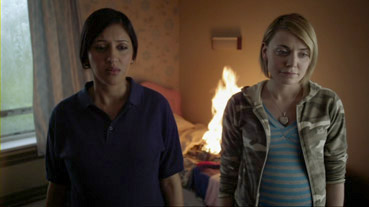
Appropriately it's Dunbar's art that brings this film to life in more ways than one. The focus of the story – if one can use such a phrase – is centred on Dunbar, but also on her eldest daughter Lorraine (Manjinder Virk). As a result, The Arbor is as much Lorraine's story as it is Andrea's, and what a fascinating story it is. We encounter Lorraine aged 29, as she reconnects with her late mother through reading her plays and letters (the majority written to Max Stafford-Clark, former Artistic Director of The Royal Court, and director of Dunbar's debut play), as well as watching the very extracts we see, while she serves a prison sentence. Throughout the film, she reflects on an incredibly troubled life, continued drug dependency and the difficult relationship she had with her mother, compared to that of younger sister Lisa (Christine Bottomley) and younger brother Andrew (Matthew McNulty), who are both doing well, and have considerably kinder things to say about their mother than Lorraine ever shares. Initially at least, she blames her mother for the course her life has taken, whereas Lisa in particular has a completely different perspective on the hardships Dunbar faced as she raised them, and the effects of her mother's tumultuous relationships with the men in her life.
A complex and multi-layered film, The Arbor is constructed from three main strands of material. The first is archive footage of Dunbar herself, collated from her various appearances throughout the 1980s, including Arena, BBC's Look North, and Yorkshire Television's The Great North Show. The second, and arguably the backbone of the film, is created from interviews Barnard conducted with members of the Dunbar family and other residents of the Buttershaw Estate over the course of two years. These were then edited to form an audio screenplay around which the shape of the film is based, and are brought to life by on screen by a diverse and universally strong cast of actors lip-synching their words. The third and final strand comes in the form of two plays which are peppered throughout the film. As you'd expect, the first of these is Dunbar's debut, The Arbor (the nickname for Brafferton Arbor, the road on which she grew up), performed by actors outside on the Buttershaw, in front of the residents. The second is Robin Soan's A State Affair, based on Dunbar's own life and written a decade after her death in 1990 from brain haemorrhage, aged 29. This is a more intriguing inclusion, and an example of Dunbar's legacy; biographically, socially and artistically, which ensures the film spans the entire spectrum of Dunbar's creative private and public life, including the years beyond it.
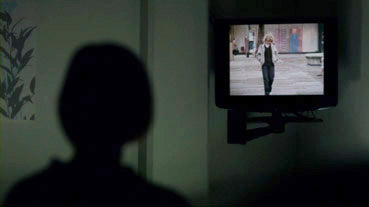
What makes The Arbor so interesting is to see what happens when these strands work together to form the story of the film. Sometimes they collide, such as the moments when Lorraine reads her mother's letters. On other occasions, they blur and twist so we're not sure whether what we're seeing is actually something Andrea herself said or it's an excerpt from The Arbor performance – this blurring works so well that Natalie Gavin who plays the part of the girl in The Arbor, has been misattributed as playing Dunbar herself, a misconception rather helped along by the fact she bears a resemblance to the writer. Most intriguingly of all, they create something entirely new, such as when the Dunbar children recall memories from their childhood. This technique is used most strikingly during the opening sequence of the film which sees Lorraine and Lisa together, recollecting a night when Lorraine accidentally set fire to the mattress in the bedroom where she and Lisa slept, and a broken door handle meant Andrea was unable to reach them, and they were later rescued by a neighbour who placed a ladder to the window.
If you're well-versed in Dunbar's biography, you won't learn much beyond what you already know, but that's not really the point of The Arbor at all. This isn't a film that trades on the lurid or the salacious (Lorraine's story alone could make a film in its own right). I'd argue that Barnard is one of few people who could make a film like this, quite simply because she's not a filmmaker who places blame, makes judgements or provides answers. Instead, she provides avenues for thought and expression, much like the role of Dunbar's semi-autobiographical writing in her own life. The judgements are for us to make and the answers are for us to find. Consequently, it's easy to surmise, if you hadn't already, that The Arbor isn't a by-the-numbers biopic; it's not even a by-the-numbers film.
This of course brings us to the question that's dominated the discussion and reception of the film: What is The Arbor? It's not a documentary by the classical definition or indeed, a narrative fiction film. That in itself has provoked a fair amount of thought and consternation from purists of both forms. But, these days, film has become such a hybridised form, it feels a little counterproductive, and dare I say rather futile exercise to try and pin down and pigeonhole any film with any degree of certainty, because it's an inherently subjective practice. As indeterminate as this may sound, The Arbor occupies a space somewhere between documentary and narrative. However, but that's not to say it's a film that feels muddy or disjointed. In fact, I'd argue it's the complete opposite, since it presents these images, words and ideas in a way that makes us question the very nature of what we're watching, why it's been made, who it's made for, and what it says to us (or doesn't). These might feel like sprawling themes to be discussing in regard to a film that's as carefully constructed film, something which Barnard herself freely admits.
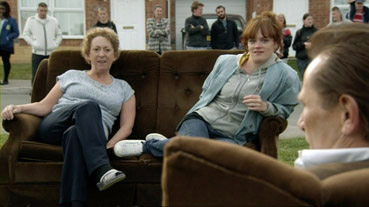
Instead of shying away from its artifice, The Arbor is a film which, for want of a better term, celebrates it. Firstly, and undoubtedly, the most obvious attention grabber in this regard is the use of lip-synching, which not only reminds us of the fact much of Dunbar's material was taken from her own life experiences, but also underlines the performative nature of acting. Secondly, on a continuing theme, there are many roles in the film that are doubled and/or refer to Dunbar's life and career, such as Danny Webb's dual role as Max Stafford-Clark and the father in the street performance of The Arbor, or George Costigan as Jimmy 'the Wig' (Dunbar's partner Jim Wheeler, father to her son Andrew) who also played Bob in Alan Clarke's Rita, Sue and Bob Too! The pinnacle of this doubling arrives when Manjinder Virk stands on a stage lip-synching for Lorraine, as she reads aloud her own part from Soan's A State Affair. Lastly, the film's subtlest nod to its creation comes in the form of the changes in the quality of the stock used throughout, noticeable when the film cuts between the archived and new material. Purely from the perspective of aesthetics, these differences draw our attention to the many and varied sources that have been edited together to make one unit. In essence, all these techniques are the filmic equivalent of showing a puppet has strings.
On the face of it then, this film appears to be yet another entrant into the ever-growing patheon of 'fake' documentary films, typified most recently by Casey Afflecks' now infamous I'm Still Here. However, to caterogise The Arbor within those confines does it a disservice on many levels. There are few films that can be realistically compared to this one, but Tomáš Hejtmánek's Sentiment, a portrait of celebrated Czechoslovakian filmmaker František Vláčil, which uses the same lip-synching technique comes the closest. Unlike Affleck, and the many directors before her, Barnard isn't interested in the mechanics of deception at all. She's interested in the mechanics of truth. If you want to be incredibly pedantic, you could ponder why she chose to use actors to lip-synch and play the roles instead of using the original footage of their real-life counterparts. Yes, on the one hand, you could accuse Barnard of 'prettying' things up for the sake of film, but on the other, she's flagging up the existence of a universal truth that we all like to disregard about cinema as a whole: it's something made, not born. Even pioneering documentarian John Grierson used scripted material, while Robert Flaherty's seminal Nanook of the North contained staged elements, and perhaps most famously of all, the Lumière brothers films weren't as natural as people liked to believe and were actually formed from several takes. Proof then, that all documentaries from whatever tradition, have seen editing of some kind, whether from a machine or from the guiding hand of their creator.
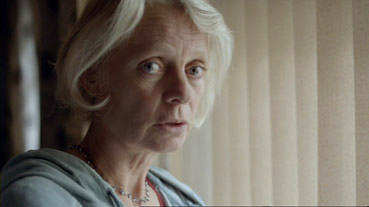
However, there is one place where this film doesn't remotely embellish or otherwise alter the facts, and that's in its representation of Andrea Dunbar (and to an extent, Lorraine). Though physically absent, her presence is weaved into the very fabric of this film, but that fabric isn't silken and perfect, it's rough and full of faults. Dunbar was no saint, and this film doesn't attempt to make her into one either, an admirable decision, especially with material like this. Ordinarily, biopics are classified by their omissions; they're as much about what they don't say rather than what they do. The Arbor, intriguingly, reverses that trait. There's an appropriate candour to this film that I think Dunbar would appreciate. The admissions – or perhaps a more accurate phrase would be confessions – of Lorraine, Lisa and the other members of the Dunbar family that will surprise, and perhaps shock some, but to not include such moments in the film would be to deny part of Dunbar's life, which she herself never shied away from in her own writing. To gloss over parts of who she was, Hollywood style, thereby making the story more palatable to the masses, would do her memory a disservice. Such actions would also make The Arbor a 'fake' film in an entirely different way, unrelated to myriad of questions that arise from its multi-layered and meta-referential construction.
Beyond its experimentation with form and aesthetic, The Arbor also treads potentially dangerous territory in other ways. As is often the case with realist works, there's an air of 'working-class chic' or dare I say 'poverty porn' to the tragedies that have befallen the Dunbar family. Yes, you will feel saddened by it, but does Barnard's film relish in that social deprivation? Not to the degree she could've. It's all too easy a criticism to dash off in regard to many a social realist film, and one that the director of Fish Tank, Andrea Arnold, has been vocal in rallying against. Regardless of the issues of class or other agendas that may be inherent in such theorising, it still doesn't change the fact that such poverty exists is and is a reality for millions of people.
But, it's not just the middle classes who posit and perpetuate these ideas either. The first quote I ever read about Dunbar as a writer, days after I watched Rita, Sue and Bob Too! was the infamous description given to her by a fellow celebrated playwright with working-class roots, Shelagh Delaney, who called her 'a genius from the slums.' My younger self was puzzled over the classification, and I was left thinking why Dunbar couldn't just be called 'a genius'. A small case of semantics, you might think, but I disliked, and still do dislike the idea of Dunbar's legacy being associated with such entrenched, negative stereotypes. Dunbar wrote what she knew, and while one half of the population would find comfort in the fact they finally had someone with a creative voice who spoke about their way of life, rather than for their way of life with the vigour of soapbox politician; for the remaining half, Dunbar's truth was, and perhaps still is, too close to the bone.
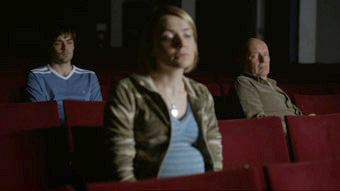
Ultimately, it simply shouldn't matter where she came from. What should matter is that Dunbar was an incredibly strong woman. Though thwarted consistently by circumstance, she was at her strongest when using her extraordinary talent for writing; speaking about the world, as she saw it, in her own voice. I'm sure that Dunbar certainly wouldn't call herself a genius, but no matter your opinion on the multi-layered construction of the film itself, you can't say that The Arbor is nothing special or just another experimental mishmash of words and images, just as you can't say Dunbar was just another writer. In her absence, Clio Barnard has given that voice a second life. If all you want to do after watching The Arbor is read Andrea Dunbar's writing and learn more about her, then surely, Barnard can and should, be praised for reinvigorating discussion about, and appreciation of, Dunbar's work.
I feel it's no coincidence that The Arbor finds its release amidst an economic downturn, where life for so many in this country or more specifically the Buttershaw estate where Dunbar grew up has changed little since the days when she struggled to bring up Lorraine on her own, dealing with things the best way she knew how. History, as they say, repeats itself, and if the film has any moral message, it's that. The parallels between Andrea and Lorraine are just as stark as they are painful, and will resonate as deeply as the images Barnard has created.
The Arbor is a film to be experienced, talked about, and reflected upon. No matter your feelings on what the film is or the complexities of its construction, I guarantee that you'll be engaged in all three for some time to come.
The Arbor was shot on the Red One camera, which is becoming something of a favourite digital replacement for 35mm and can produce a pleasingly film-like image, true colours and a nicely non-aggressive contrast range. Such is certainly the case here, at least on the footage shot specifically for the film. Inevitably there's some variance in the film-shot archive material, though even this has been cleaned up and precision graded. Surprisingly, the extracts from Alan Clarke's film version of Rita, Sue and Bob Too! are in slightly less impressive shape, and the video interviews with Dunbar do show their age.
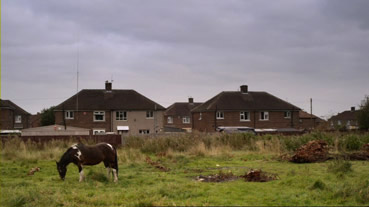
The choice between Dolby stereo 2.0 and surround 5.1 is once again largely about finesse – little use is made of the surrounds on the 5.1, with even the score sitting mostly at the front. But sit the two side-by-side and the stereo track is both louder and sonically a little coarser – there's a subtlety to the 5.1 that is instantly preferable. An adio descriptive track is also included, as are optional subtitles for the hearing impaired.
A fantastic-looking transfer from Verve, with a small, but perfectly formed package of supplements. The star of the show is definitely the film, and in this case, it's no bad thing.
Trailer (1:36)
A nicely constructed and surprisingly absorbing piece that captures the mood of the film well, not an easy task with a film like this. The main emphasis, is as you'd expect, on the obvious uniqueness of the film and its subject. A liberal sprinkling of press quotes are also included to reinforce its many achievements.
Road Race [short] (14:02)
Made in 2004, this video installation was first exhibited at London's Platform gallery. Combining both DV and Super 16mm stock, the film centres on a group of Gypsies who race horses competitively along the M2, gathering from miles around to take part and place bets. Road Race builds upon ideas present in Barnard's earlier films Lambeth Marsh and Random Acts of Intimacy, while deftly showcasing the director's unique aesthetic and approach, typified by her skill at merging fact and fiction, by using actual recorded audio and video with fact-based footage created specifically for the film or vice versa.
Much like The Arbor, this film will make you think about the relationship between the two and question when and where the two intersect. Barnard even anticipates and encourages such debate, by showing us different perspectives on the factual and the fictitious material simultaneously, using split screen and picture-in-picture techniques (or as shown in the installation view, a projection screen and a television). This creates a literal, visual and auditory clash of culture that mirrors the social one unfolding before our eyes as we watch, and makes for an intriguing and memorable viewing experience.
An intriguing and rather unique cinematic legacy for one of Britain's finest writing talents, the late Andrea Dunbar, The Arbor is an incredibly powerful and deeply affecting film, that has strong presence all of its own. While director Clio Barnard's approach and methods are undoubtedly divisive, they are also deftly executed, and that reason amongst many make this required viewing. Highly recommended.
|